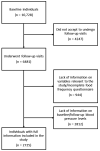Coffee consumption and risk of hypertension in the Polish arm of the HAPIEE cohort study
- PMID: 26220566
- PMCID: PMC4650259
- DOI: 10.1038/ejcn.2015.119
Coffee consumption and risk of hypertension in the Polish arm of the HAPIEE cohort study
Abstract
Background/objectives: Coffee consumption has been hypothesized to be associated with blood pressure (BP), but previous findings are not homogeneous. The aim of this study was to evaluate the association between coffee consumption and the risk of developing hypertension.
Subjects/methods: Data on coffee consumption, BP and use of anti-hypertensive medicament were derived from 2725 participants of the Polish arm of the HAPIEE project (Health, Alcohol and Psychosocial factors In Eastern Europe) who were free of hypertension at baseline and followed up for an average of 5 years. Odds ratios (ORs) and 95% confidence intervals (CIs) were calculated by multivariate logistic regression analyses and stratified for potential confounding factors.
Results: Coffee consumption was related to decreased age, smoking status and total energy intake. Compared with persons who drink <1 cup coffee per day, systolic BP was significantly associated with coffee consumption and the risk of hypertension was lower for individuals consuming 3-4 cups per day. Despite the analysis stratified by gender showed that the protective effect of coffee consumption on hypertension was significant only in women, the analysis after stratification by smoking status revealed a decreased risk of hypertension in non-smokers drinking 3-4 cups of coffee per day in both sexes (OR 0.41, 95% CI: 0.21, 0.79 for men and OR 0.54, 95% CI: 0.29, 0.99 for women). Upper category coffee consumption (>4 cups per day) was not related to significant increased risk of hypertension.
Conclusions: Relation between coffee consumption and incidence of hypertension was related to smoking status. Consumption of 3-4 cups of coffee per day decreased the risk of hypertension in non-smoking men and women only.
Figures
References
-
- Kearney PM, Whelton M, Reynolds K, Muntner P, Whelton PK, He J. Global burden of hypertension: analysis of worldwide data. Lancet. 2005;365:217–223. - PubMed
-
- Grigg D. The worlds of tea and coffee: patterns of consumption. GeoJournal. 2003;57:283–294.
-
- Higdon JV, Frei B. Coffee and health: a review of recent human research. Crit Rev Food Sci Nutr. 2006;46:101–123. - PubMed
-
- Godos J, Pluchinotta FR, Marventano S, Buscemi S, Li Volti G, Galvano F, et al. Coffee components and cardiovascular risk: beneficial and detrimental effects. Int J Food Sci Nutr. 2014;21:1–12. - PubMed
Publication types
MeSH terms
Substances
Grants and funding
LinkOut - more resources
Full Text Sources
Other Literature Sources
Medical



